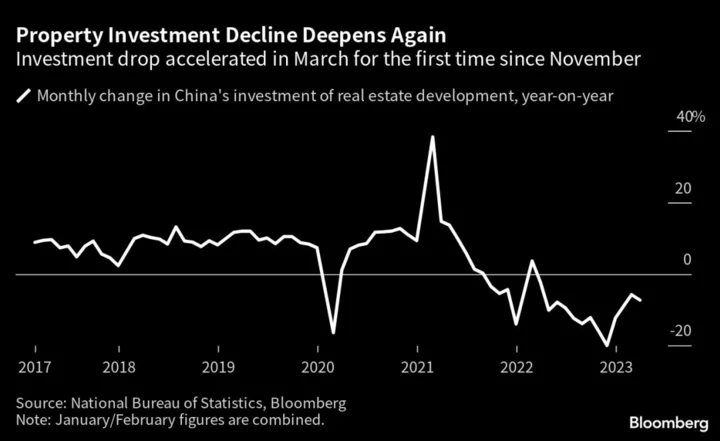China is considering a broad package of stimulus measures as pressure builds on Xi Jinping’s government to boost the world’s second-largest economy, according to people familiar with the matter.
The stimulus proposals, drafted by multiple government agencies and partially reported by Bloomberg News earlier this month, include at least a dozen measures designed to support areas such as real estate and domestic demand, the people said, asking not to be named because the matter is private.
Interest-rate reductions are also among the policies under consideration, the people added. Investor speculation about looming cuts to China’s longer-term policy rates intensified on Tuesday after the central bank unexpectedly lowered its seven-day reverse repurchase rate.
A key part of the proposed stimulus package involves supporting the real estate market. Regulators are seeking to lower costs on outstanding residential mortgages and boost relending through the nation’s policy banks to ensure homes are delivered, one of the people said.
The plan has yet to be finalized and may be subject to change, the people added. The State Council may discuss the policies as soon as this Friday but it’s unclear when they will be announced or implemented, the people said. Further details on the scope of the proposed stimulus package weren’t immediately available.
Read more: China Central Bank Surprises With Rate Cut to Spur Economy
While investors will likely welcome further efforts by Chinese authorities to support the economy, much will hinge on the ultimate size and makeup of the stimulus measures. The muted market reaction to the central bank’s reverse repo rate cut on Tuesday underscored mounting skepticism that monetary policy alone can reinvigorate an economy weighed down by record debt levels, waning global demand, and weak confidence among businesses and consumers rattled by years of unpredictable policy shifts.
Concerns about financial fragility — particularly among China’s local governments and property developers — have also made policy makers wary of repeating the mega-stimulus packages that helped revive the economy in previous downturns.
The central bank and the nation’s top planning agency didn’t immediately respond to requests seeking comment.
China’s government set a relatively conservative growth target of about 5% for the year, with the recent slump in activity clouding the outlook for that goal.
Signs of renewed weakness are also emerging in the country’s housing market, one of China’s biggest growth drivers, despite a 16-point rescue plan in November. While the new policies could help mitigate a sudden collapse in the sector, they are unlikely to turn on the spigot for loans and spur a buying frenzy anytime soon.
Analysts at Goldman Sachs Group Inc. expect a multi-year property slowdown, saying policymakers appear reluctant to use real estate as a short-term stimulus tool and want to reduce the economy’s reliance on the industry. China could ease credit for new homebuyers and upgraders, allow additional cuts on mortgage rates and down-payment ratios, and further relax home purchase restrictions, they said in a note.
PBOC Governor Yi Gang last week vowed to step up “counter-cyclical adjustments,” a shift in language that some analysts said signaled more easing. He also pledged to “make all efforts to support the real economy” as the recovery in demand has lagged that of supply.
Sales in the real estate sector have fizzled out following a brief rebound early this year. Distress is spreading from private developers to state-owned enterprises, and from smaller cities to top-tier ones, where “secondary markets are suffering from a glut of eager sellers despite plummeting sales,” Nomura Holdings Inc. analysts led by Lu Ting wrote.
A mountain of developer debt — equal to about 12% of China’s GDP — is at risk of default, according to Bloomberg Economics. The industry’s renewed downturn has been a major factor weighing on Chinese markets this year.
A key gauge of Chinese developer shares has dropped about 20% this year, with Sunac China Holdings Ltd. tumbling 68%. Iron ore is down about 6% year-to-date, after a rally began to fade in mid-March.

